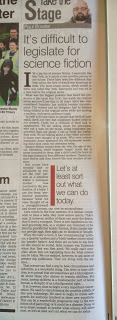My column in The Kerryman. 27 March, 2013
I’m a big fan of science fiction. I especially like Star Trek, as it paints such a positive picture of our future. There have been five different Star Trek series. The very first of the franchise was broadcast in 1966. The most recent series ended in 2005. The series which ended in 2005, called Star Trek: Enterprise, was conceived of as a prequel to the original series.
What was the biggest problem that faced the producers of this latest Star Trek? Just watch the original series and you’ll see very quickly, that in 30 years what was once considered futuristic has quickly become commonplace. The writers and set designers had to balance being faithful to the original series with not offending the sensibilities of a modern tech-savvy audience.
In 1966 it would not have occurred to anyone, that we could all have small, sleek and very fast computers, tucked away in our pockets. That’s not a criticism of their lack of imagination. We are talking about the generation who put a man on the moon, using computers less powerful than the phone I use to order my Indian food with. We are talking about a time when automatic doors were cutting-edge. Who even notices automatic doors anymore? It’s revolving doors that catch our attention these day.
Science fiction writers from the 60s, the age of sexual liberation, could imagine ‘magic‘ doors, but it never occurred to them, that a child could be born in the 21st Century, to four different mothers. There’s science fiction and then there’s the true wonder of science.
Our courts have recently had to adjudicate on who are the ‘real’ parents in a situation, where a surrogate mother was involved in the production of a baby. I use the term ‘production’ purposely, because what we once thought of as a rather straightforward, biological and closed process, is now anything but closed.
Let’s return to the four mothers scenario. If a lesbian couple wish to have a baby, they must source sperm. That’s relatively easy. If however neither of them can carry the foetus, then a surrogate will be required. There is zero legislation in Ireland governing this, so a woman can volunteer or be hired to provide her womb. Further, if this couple cannot provide eggs, then eggs can be donated or bought.
When the baby is born, it has ‘commissioning’ mothers, a ‘genetic’ mother and a ‘birth’ mother. Not to mention a ‘genetic’ father. So many possibilities yet there are no laws to say how all this should be managed. Seán Lemass was Taoiseach when Star Trek was first aired. We really can’t complain about him not legislating then for what science can do today. We our entitled however to ask more of present day politicians. They are living with the science.
That science can find a way to defeat circumstance and infertility is a wonderful thing. The drive to have children is so primal, that we sometimes get a bit judgmental about those who choose to remain childless. For many, having children is a fundamental part of being human and thought of as a fundamental right.
It is, however, time to begin a very important conversation. We need to start debating the possible pitfalls of this new technology. We need to begin to create safeguards for everyone involved in these new equations. This can be a wonderfully progressive step in the evolution of our understanding of parenting, or it could be a disaster. None of us is smart enough to predict the science will allow next, so let’s at least sort out what we can do today.




